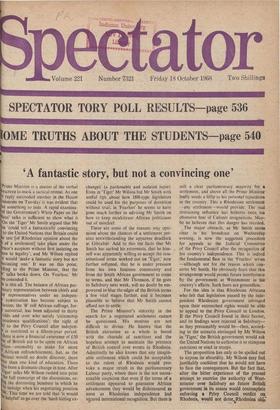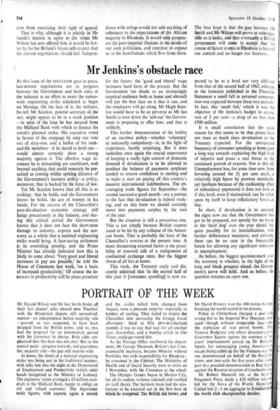`A fantastic story, but not a convincing one'
Prime Minister is a master of the verbal escreep to mask a tactical retreat. As one reply succeeded another in the House mmons on Tuesday it was evident that d something to hide. A rapid examina- of the Government's White Paper on the less' talks is sufficient to show what it On the Tiger' Mr Smith argued that Mr n 'could tell a fantastically convincing to the United Nations that Britain could e test [of Rhodesian opinion about the of a settlement] take place under the rnor's auspices without first insisting on rn to legality'; and Mr Wilson replied It would 'make a fantastic story but not [wincing one.' It was on this point, cling to the Prime Minister, that the r' talks broke down. On 'Fearless,' Mr conceded it.
r is this all. The balance of African par- ntary representation between chiefs and d representatives under an indepen- constitution has become subject to ation; the 'B' roll African suffrage, for- universal, has been adjusted to thirty olds and over who satisfy 'citizenship residence qualifications'; the right of .Etl to the Privy Council after indepen- e is restricted to a fifteen-year period. there is now a financial sweetener of £50 'on of British aid to be spent on African ation—ostensibly to make for more itt African enfranchisement, but, as the esians would no doubt discover, there Ore than one kind of education. There LitS0 been a dramatic change in tone. After tiger' talks Mr Wilson rushed into print the full transcript of the discussions, re- 418 the distressing bombast in which he to indulge when his negotiating position e41c. This time we, are told that 'it would `le helpful' to go over the 'hard-hitting ex- changes' (a pardonable and isolated lapse). Even in 'Tiger' Mr Wilson fed Mr Smith with useful tips about how 18B-type legislation could be used for the purposes of detention without trial; in 'Fearless' he seems to have gone much further in advising Mr Smith on how to keep recalcitrant African politicians out of mischief.
These are some of the reasons why opti- mism about the chances of a settlement per- sists notwithstanding the apparent 'deadlock at Gibraltar. Add to this the facts that Mr Smith has sacked his extremists, that he him- self was apparently willing to accept the con- stitutional terms worked out on 'Tiger,' now further softened, that he is under pressure from his own business community and from the South African government to come to 'terms, and that Mr Thomson, if he goes to Salisbury next week, will no doubt be em- powered to blur the edges of the British terms a few vital stages further, and it becomes plausible to believe that Mr Smith cannot afford not to settle.
The Prime Minister's sincerity in the search for a negotiated settlement cannot be questioned. His motives are not difficult to divine. He knows that the British electorate as a whole is bored with the charade of sanctions and the hopeless attempt to maintain the pretence of British control over events in Rhodesia. Admittedly he also knows that any imagin- able settlement which could be acceptable to the rulers of Rhodesia would pro- voke a major revolt in the parliamentary Labour party, where there is the not unrea- sonable suspicion that even if the terms of a settlement appeared to guarantee African advancement they would be dishonoured as soon as Rhodesian independence had secured international recognition. But there is still a clear parliamentary majority for s settlement, and above all the Prime Minister badly needs a' fillip to his personal reputation in the country. This a Rhodesian settlement —any settlement—would provide. The real restraining influence has hitherto been his obsessive fear of Cabinet resignations. May- be he believes that this danger has receded.
The major obstacle, as Mr Smith made clqar in his broadcast on Wednesday evening, is now the suggested procedure for appeals to the Judicial Committee • of the Privy Council after the recognition of his country's independence. This is indeed the fundamental flaw in the 'Fearless' terms —although not for the reason which con- cerns Mr Smith. He obviously fears that this arrangement would permit. future interference by the government at Westminster in his country's affairs. Such fears are groundless.'
For. the idea is that Rhodesian Africans who felt that legislation passed by the hide; pendent Rhodesian government infringed upon their entrenched rights would be able to appeal to the Privy Council in London. If the Privy Council found in their favour. and its findings were rejected in Salisbury— as they presumably would be—then, accord- ing to the scenario envisaged by Mr Wilson in Tiger,' the British government would ask the United Nations to authorise it to reimpose sanctions or send in troops.
The proposition has only to be spelled out to expose its absurdity. Mr Wilson may feel justifiably confident that he would not have to face the consequences. But the fact that, after the bitter experience of the present attempt to exercise the authority of West- zens from exercising their right of appeal.
That is why, although it is plainly in Mr Smith's interest to agree to the terms Mr Wilson has now offered him, it would be bet- ter by far for Britain's future self-respect that the current negotiations should fail. Indepen- dence with strings would not add anything of substance to the expectations of the African majority in Rhodesia. It would only perpetu- ate the post-imperial illusions in the minds of our own politicians, and continue to expose us to the humiliations which flow from them. The best hope is that the t ap between Mr Smith and Mr Wilson will prove as unbridge- able as it looks, and that eventually a British government will come to accept that the course of future events in Rhodesia is beyond our control and no longer our business.







































